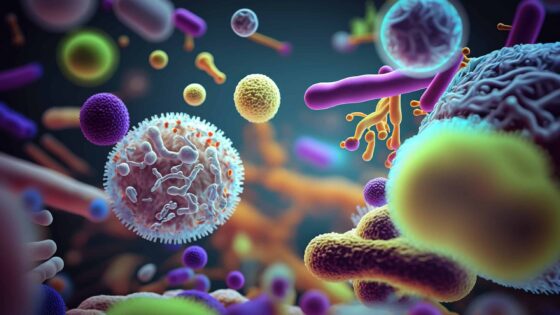
The microscopic world that surrounds us is filled with countless living organisms, including bacteria. Despite their small size, these tiny creatures play a significant role in our lives. Some bacteria are known for causing diseases, while others are fundamental to maintaining our bodies’ overall health. In this article, we will explore the difference between good and bad bacteria.
The Good & Bad
Bacteria are single-celled organisms that exist everywhere in the world, from soil to water to human bodies. Although the number of bacteria species is vast, they are usually classified into two broad categories: good and bad. Good bacteria, commonly known as probiotics, play a significant role in our health – they help break down food, support digestion, and protect our bodies against disease-causing bacteria. Bad bacteria, on the other hand, are known to cause diseases, infections, and illnesses, ranging from minor skin infections to life-threatening conditions.
Characteristics Of Good & Bad Bacteria
One of the easiest ways to understand the difference between good and bad bacteria is to learn about their characteristics. Good bacteria are live organisms that are added to food products, including yogurt, kombucha, and sourdough bread, to enhance their taste and nutritional benefits. They can also come in the form of supplements, which help support a healthy digestive system and boost the immune system. Conversely, bad bacteria, which include strains such as E. coli and Salmonella, are responsible for illnesses like food poisoning and mild to severe infections.
Another significant difference between good and bad bacteria is their effect on the human body. Good bacteria reside primarily in the gut and work together to help break down food and extract useful nutrients. Probiotics also play a crucial role in maintaining a healthy balance of microorganisms in the gut, resulting in better digestion and overall wellbeing. Conversely, bad bacteria can harm the human body by producing toxins and causing severe infections that could result in complications.
It’s essential to remember that good and bad bacteria are not entirely separate entities. Many bacterial strains, like Escherichia coli, have both good and bad variants. While most strains of E. coli are harmless and essential for digestion, others are harmful and can cause severe illness. Likewise, some bad bacteria, like Staphylococcus aureus, are present in our bodies in small quantities but can cause infection should they overgrow.
The Role Of Good Bacteria
Good bacteria play a significant role in maintaining our overall health and wellbeing. These tiny microorganisms are responsible for a range of functions, including digestion, immune system support, and even mental health. Without these beneficial bacteria, our bodies may become more susceptible to disease and infection. That’s why it’s crucial to maintain a healthy balance of good bacteria in our gut by consuming foods like yogurt, fermented vegetables, and kefir, which are rich in probiotics. Additionally, research has shown that probiotics can help alleviate symptoms of conditions such as irritable bowel syndrome, allergies, and even depression. By nurturing the population of good bacteria within our bodies, we can safeguard our health and vitality for years to come.
Conclusion
Bacteria are essential to our overall health, and understanding the difference between good and bad bacteria can help people make informed decisions about their health choices. By consuming probiotic-rich foods, we help support the community of good bacteria that reside in our gut, resulting in better digestion and overall wellbeing. On the other hand, staying away from bad bacteria and practicing proper hygiene can reduce the risk of infections and illnesses. It’s crucial to remember that not all bacteria are created equal, and becoming informed about the types of bacteria present in our environment can result in healthier lifestyles. For more health related articles, visit www.FamilyFirstUrgentCare.com.
- Urgent Care Myths Debunked: What You Really Need to Know - November 21, 2024
- Behind the Scenes: A Day in the Life of an Urgent Care Professional - November 7, 2024
- When to Choose Urgent Care Over the ER: A Quick Guide - October 23, 2024



